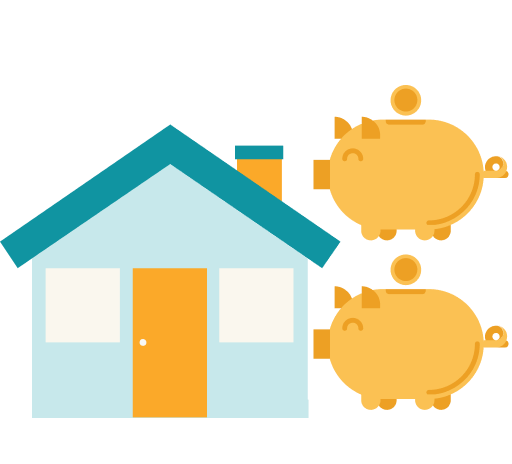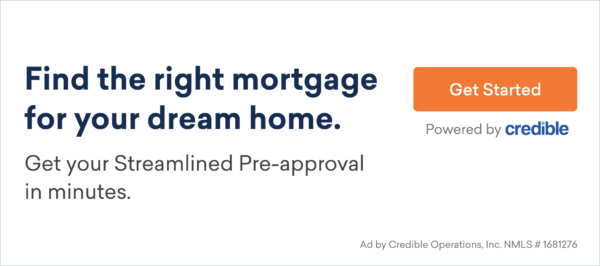Credible Operations, Inc. NMLS# 1681276, “Credible.” Not available in all states. www.nmlsconsumeraccess.org.
Owning a home is an integral part of the American dream — and homeownership may be possible even if you earn a lower income. There are low-income mortgage programs available that aim to help people buy a home.
Having good credit and the ability to stick to a budget could make it easier to take advantage of programs that offer down payment or closing cost assistance. And scoring a low interest rate on a mortgage now could mean significant savings in interest costs over the life of your mortgage.
Let’s look at how to get a mortgage with a low income, what programs may be available to you, and any downsides you need to watch for.
Can you get a mortgage with a low income?
It’s possible to get a mortgage with a low income, but qualification requirements vary depending on the lender and the program.
Generally, you also don’t need a high credit score to qualify for low-income mortgage programs. For example, you may be able to qualify for a loan backed by the Federal Housing Administration — known as an FHA loan — with a credit score as low as 500 if you have a 10% down payment.
State and federal programs are also available to help low-income buyers who have little or no down payment. USDA loans, for example, offer 100% financing assistance to eligible homebuyers who want to buy, build, renovate, or relocate a home in an eligible rural area.
Programs may also provide useful financial education to help you successfully navigate your finances as a new homeowner. But if the program you’re interested in doesn’t offer education, you can chat with a mortgage consultant about homebuyer educational resources.
You can learn more about mortgages and compare rates from multiple lenders through Credible.
What’s the minimum income you need to qualify for a mortgage?
Generally, there’s no minimum income requirement that you must meet in order to qualify for a mortgage. Instead, your lender will evaluate your debt-to-income (DTI) ratio, which represents how much of your income each month goes toward debt payments.
The lower your DTI is, the better, as lenders will be more confident that you can make your mortgage payments. This isn’t just a preference that lenders have — federal regulations require FHA lenders to weigh your income against your debt to confirm that your income is sufficient to cover all your expenses and your monthly mortgage payment.
It’s important to note that even if you are approved for a mortgage, you need to be confident that you can afford to make your payments on time each month.
Who qualifies for low-income mortgages?
Low-income mortgage requirements vary by program (we’ll break down a few examples shortly). In some cases, you must be a member of a specific group, such as being Native American or an active-duty service member.
Some programs also may not take your available down payment or credit score into consideration when reviewing your application.
What are the best low-income mortgage programs?
Let’s take a look at a few mortgage programs that are a good fit for those with low income.
HomeReady mortgage
Who the program is for: Low-income borrowers with decent credit who have limited cash for a down payment.
How it works: Lower down payment requirement, broader allowable sources for down payment funds (for example, gifts and grants)
Credit score requirements: 620
Down payment requirements: 3%
Other eligibility requirements: Requires homeownership education classes if all borrowers involved are first-time homebuyers.
Home Possible mortgage
Who the program is for: First-time homebuyers and low- to moderate-income buyers
How it works: Low down payment requirements, reduced mortgage insurance limits, fixed-rate mortgages, no cash-out refinancing, and flexible closing cost funding options
Credit score requirements: 660
Down payment requirements: 3%
Other eligibility requirements: Annual income can’t exceed 100% of the area median income.
USDA Single Family Housing Program
Who the program is for: Low- or moderate-income applicants looking to buy or build in an eligible rural area.
How it works: Helps lenders provide home financing programs to low- or moderate-income borrowers and doesn’t require a down payment.
Credit score requirements: None
Down payment requirements: None
Other eligibility requirements: Even though no minimum credit score is required, you need to demonstrate both a willingness and an ability to repay the loan.
VA home loan
Who the program is for: Veterans, current service members, and eligible surviving spouses of military members
How it works: You’ll work with a private lender, such as a bank or mortgage company, to get a VA home loan. Because the Department of Veterans Affairs guarantees a portion of the loan, lenders tend to offer more favorable terms.
Credit score requirements: Varies by lender
Down payment requirements: Varies by lender
Other eligibility requirements: While there are some exceptions, you generally must meet minimum service requirements.
HUD Good Neighbor Next Door
Who the program is for: Teachers, firefighters, law enforcement offers, and emergency medical technicians
How it works: Homes must be located in a revitalization area and listed exclusively for sale through the Good Neighbor Next Door Sales program. Buyers get a 50% discount on the home’s list price.
Credit score requirements: 500 to 570 (for a maximum loan of 90% of the home’s value) or 580 (maximum financing)
Down payment requirements: $100
Other eligibility requirements: You must live in the property for 36 months, and it has to be your principal residence.
FHA home loan
Who the program is for: Borrowers with a steady income, proof of employment, and who are purchasing their primary residence may be eligible for an FHA loan.
How it works: The FHA provides mortgage insurance for loans issued by FHA-approved lenders.
Credit score requirements: 500
Down payment requirements: 3.5% (580 credit score) or 10% (500 to 579 credit score)
Other eligibility requirements: You’ll need to have mortgage insurance and a debt-to-income ratio of less than 43%.
Manufactured home loan
Who the program is for: Any buyer who meets the credit requirements and makes the manufactured home their primary residence.
How it works: Private lenders make loans and the FHA insures the loan to buy a manufactured home.
Credit score requirements: None
Down payment requirements: 5% with a credit score above 500 or 10% with a credit score of 500 or lower
Other eligibility requirements: You must provide your own down payment, and you might have to pay mortgage insurance premiums.
Down payment assistance programs (DPAs)
Who the program is for: Requirements for eligibility vary, but often these programs provide support to Native Americans, veterans, health care workers, law enforcement officers, firefighters, and education providers.
How it works: Down payment assistance programs can come from city, county, and state governments. These programs provide down payment assistance that starts at a few thousand dollars.
Credit score requirements: Varies by program
Down payment requirements: Varies by program
Other eligibility requirements: Varies by program
Mortgage credit certificates (MCCs)
Who the program is for: First-time homebuyers looking to buy a new or existing single-family house.
How it works: MCCs are tax credits based on the amount of mortgage interest you paid over the course of the year, up to $2,000. Check with your local Housing Financing Agency for more details. .
Credit score requirements: Varies by program
Down payment requirements: Varies by program
Other eligibility requirements: Varies by program
To compare rates from multiple lenders, and instantly generate a pre-approval letter, visit Credible.
What are the pros and cons of low-income mortgages?
Before applying for a low-income mortgage, you’ll want to carefully consider both the advantages and disadvantages.
Pros
- Get into a home: Low-income mortgage programs can help you get into a home, even if your current income is on the lower side.
- Can help grow wealth: Homeownership can help low-income Americans build wealth, according to research by Habitat for Humanity.
- Builds equity: Each month that you pay your mortgage, your equity grows.
- May boost your credit score: If you make your mortgage payments on time each month, your credit score could benefit.
Cons
- May cost more: Putting little or no money down means financing more of the cost of the home — and paying more interest over time. A down payment of less than 20% also generally means you’ll have to pay private mortgage insurance.
- Might still pay closing costs: Even if you don’t need a down payment, you’ll likely still need some cash in order to close. Closing costs can run you 2% to 5% of your home’s price.
- Could make your budget tighter: A mortgage payment is a big financial commitment. Make sure you can afford all your monthly payments, including housing costs, before taking on a mortgage.
- Little or no equity at first: Because most of the cost of your home is financed, it will take a while to build up equity.
Tips for improving your chance of getting a low-income mortgage
While there’s no guarantee you can qualify for a low-income mortgage, here are a few things you can do to improve your odds of getting one:
- Save for a down payment. Not all low-income mortgage programs require a down payment, but many do, so you’ll want to start saving for one. Remember, the bigger your down payment, the less you’ll have to finance — and pay interest on.
- Work on improving your credit. If your credit score needs a boost, doing things like paying down your debt and paying your bills on time can help you improve it. If your credit score is good, focus on maintaining your current score.
- Pay down other debt. Your debt-to-income ratio is an important factor in your ability to get a mortgage. Reducing your debt can improve your DTI, and your chances of getting approved for a home loan.
- Budget in advance. Use a mortgage calculator to get an idea of how much you can pay each month so you know how much of a mortgage you can afford to take on.
- Work with a knowledgeable real estate agent. Shop around until you find a real estate agent that can understand your homebuying needs and how to help you get into the right home.



